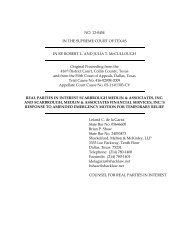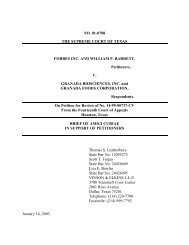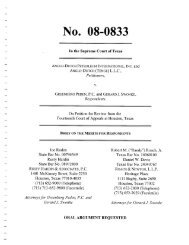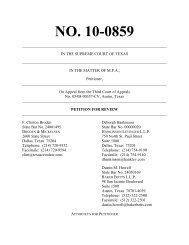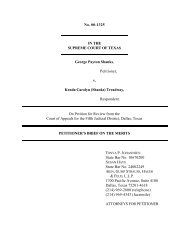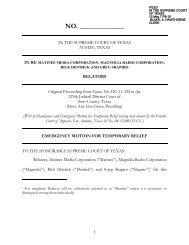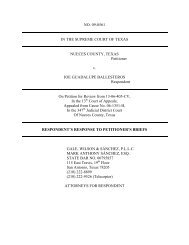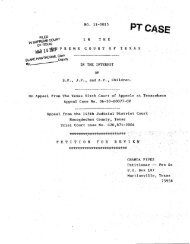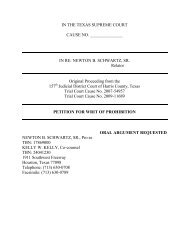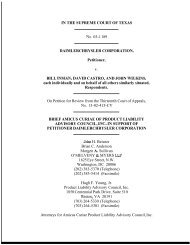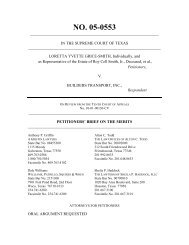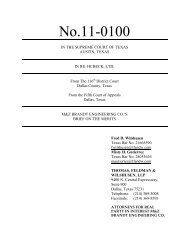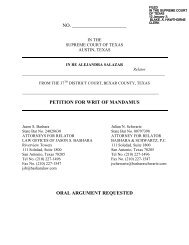Petition for Writ of Mandamus - Filed - Supreme Court of Texas
Petition for Writ of Mandamus - Filed - Supreme Court of Texas
Petition for Writ of Mandamus - Filed - Supreme Court of Texas
Create successful ePaper yourself
Turn your PDF publications into a flip-book with our unique Google optimized e-Paper software.
"requires some definite link, some minimum connection, between a state and the person,<br />
property, or transaction it seeks to tax." Quill Corp. v. North Dakota, 504 U.S. 298, 312 (1992)<br />
(quoting Miller Bros. v, Maryland, 347 U.S. 340, 344-45 (1954)); see U.S. CONST. Amend XIV,<br />
§ 1. In the case <strong>of</strong> a tax on an activity, there must be a connection to the activity itself, rather<br />
than a connection only to the entity the State seeks to tax. Allied-Signal, Inc. v. Director, Div. <strong>of</strong><br />
Taxation, 504 U.S. 768 (1992). The test is whether the taxing power exerted by a state bears<br />
fiscal relation to protection, opportunities, and benefits given by the state, Wisconsin v, J. C.<br />
Penney Co., 311 U.S. 435, 444 (1940); Norfolk & W Ry. v. Mo. State Tax Comm'n,<br />
390 U.S.<br />
317, 326 n.5 (1968). The simple but controlling question is whether the State has given anything<br />
<strong>for</strong> which it can ask a return. J.C. Penney, 311 U.S. at 444.<br />
30, The Margin Tax imposes a 0.5% tax on wholesalers and retailers and a 1% tax on<br />
manufacturers, Pursuant to the Due Process Clause, this significant difference in tax rate must<br />
be based on a difference in the protections, opportunities, and benefits conferred by <strong>Texas</strong> on the<br />
entities. In other words, manufacturers must receive greater benefits from <strong>Texas</strong> than<br />
wholesalers and retailers receive. This is not the case with entities, such as Nestle, that<br />
manufacture outside <strong>of</strong> <strong>Texas</strong>, but only wholesale and/or retail within <strong>Texas</strong>. Such entities do<br />
not receive any additional benefits from <strong>Texas</strong> with respect to their manufacturing operations.<br />
By taxing these entities based on activities <strong>for</strong> which <strong>Texas</strong> confers no benefit, the Margin Tax<br />
violates the Due Process Clause <strong>of</strong> the United States Constitution,<br />
D. The Margin Tax Violates the Commerce Clause <strong>of</strong> the United States Constitution.<br />
31. The Commerce Clause prohibits discrimination against interstate commerce and<br />
bars state regulation that unduly burdens interstate commerce. Quill, 504 U.S. at 312; see U.S.<br />
CONST. art. 1, § 8. Specifically, the Commerce Clause requires that a state tax (1) be applied to<br />
an activity with a substantial nexus with the taxing state, (2) be fairly apportioned, (3) not<br />
-10-



